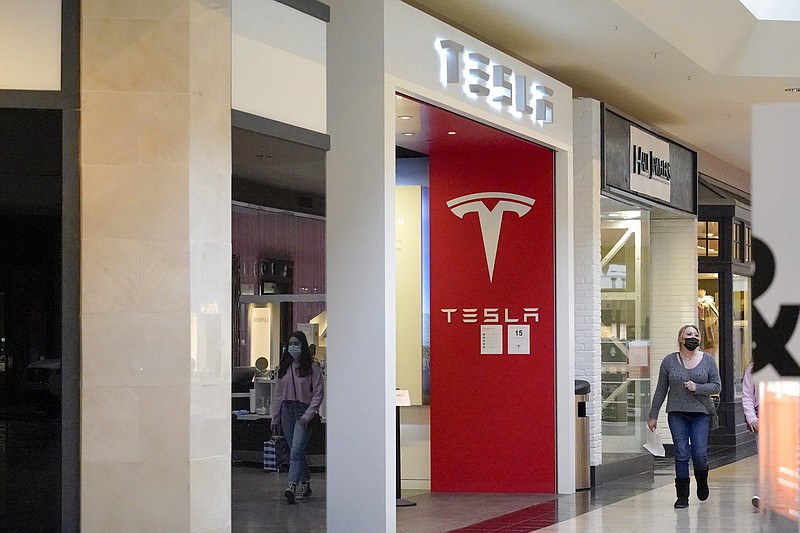Tesla shares fell 5% Monday in New York after Chief Executive Officer Elon Musk said he would sell 10% of his holdings in the electric carmaker -- more than $20 billion worth by most calculations -- based on the results of a poll he conducted on Twitter over the weekend.
According to analyst Daniel Ives of Wedbush Securities, Musk owns about 23% of Tesla's stock and has about $10 billion in taxes coming due to stock options that vest next summer.
Much of Musk's wealth is held in shares of Tesla, which does not pay him a cash salary. "I only have stock, thus the only way for me to pay taxes personally is to sell stock," Musk tweeted.
Many on Wall Street assumed Musk would be selling closer to 5% of his stake, Ives said, but even doubling that number doesn't cause him or his firm great concern. Ives said better to "rip the Band-Aid off now" and avoid speculation.
"Tesla remains in pole position to drive this EV [electric vehicle] adoption curve to the next level both domestically and globally with Musk & Co. leading the way," Ives wrote in a note to clients.
Tesla has been on a roll.
As of Friday, the shares had gained more than 40% since last month when the company announced a record profit for the third quarter. Last week, Tesla shares hit an all-time closing high of $1,229.91 per share.
It's the most valuable carmaker in the world with a market capitalization of more than $1 trillion. Shares are still up nearly 60% for the year.
Musk, whose net worth is around $300 billion, said he proposed selling the stock as some Democrats have been pushing for billionaires to pay taxes when the price of the stocks they hold goes up, even if they don't sell any shares. However, the wording on unrealized gains, also called a "billionaires tax," was removed from President Joe Biden's budget, which is still being negotiated.
"Much is made lately of unrealized gains being a means of tax avoidance, so I propose selling 10% of my Tesla stock," he tweeted Saturday afternoon. "Do you support this?"
Musk said he would abide by the results of the poll, which ended with 58% of more than 3.5 million votes calling for him to sell the stock. He did not say when he would sell the stock.
Musk is known for roiling markets with his sometimes flippant and ill-advised tweets. Last Tuesday, Tesla shares tumbled more than 3% after Musk tweeted that a deal to sell 100,000 Teslas to Hertz had not yet been signed. Hertz said the cars were already being delivered.
Ives called Musk's recent Twitter poll "another bizarre soap opera that can only happen to one company and one CEO in the world, Musk."
STOCK OPTIONS ANGLE
Musk may soon have needed to sell a big chunk of his shares anyway. He holds nearly 23 million stock options that were awarded in 2012. Those options have since vested and will expire in August 2022.
Most stock grants allow executives to avoid paying taxes for years and perhaps forever, as long as they do not sell the shares they get from converting the option. But Brian Foley, an executive compensation consultant, says that because of the size of Musk's grant and the way it was structured, it is likely that much of his 2012 options do not qualify for the preferential tax treatment.
That means Musk would owe income taxes when he exercises the grant, which at current prices would be worth just under $30 billion. Musk's tax bill could top $10 billion, depending on what percentage of the options do not qualify for the preferential treatment.
"They are a ticking tax time bomb," Foley said of Musk's stock options. "Offhand, I can't think of any way for him to get around paying the tax."
James Cox, a professor at Duke University law school and an expert in securities laws, said it might be hard for Musk to go back on his Twitter pledge.
"It's a no-win situation," Cox said. "In the securities law, the problem is this could be seen as a misrepresentation that was meant to mislead if another shareholder sold on Musk's tweet."
TWEET TROUBLE
But Cox said it would be a hard lawsuit to win, because CEOs are allowed to make statements and change their minds, as long as they meant what they said when they said it.
It would not be the first time that Musk has gotten into trouble over his tweets.
In late 2018, he and Tesla settled a lawsuit by the Securities and Exchange Commission, without admitting guilt for tweeting about a potential sale of Tesla that never happened. Musk was also sued for defamation in 2018 after calling a diver who had helped rescue children stuck in a cave in Thailand a "pedo guy" on Twitter. Musk won the suit.
Daniel Ives, a stock analyst at Wedbush Securities who follows Tesla, called Musk's latest Twitter pledge "bizarre" but said he thought that given Tesla's prospects and the investor enthusiasm for the company, the stock, which is up more than 60% this year, would keep climbing, even with Musk cashing out a portion of his holdings.
"Musk was likely to sell some of his Tesla stock before year end, but no one ever imagined there would be a Twitter poll translating into a 10% sale of his ownership," Ives said. "This weekend's Twitter poll was a strange one even for Elon."
Information for this article was contributed by Matt Ott of The Associated Press and by Stephen Gandel of The New York Times.
